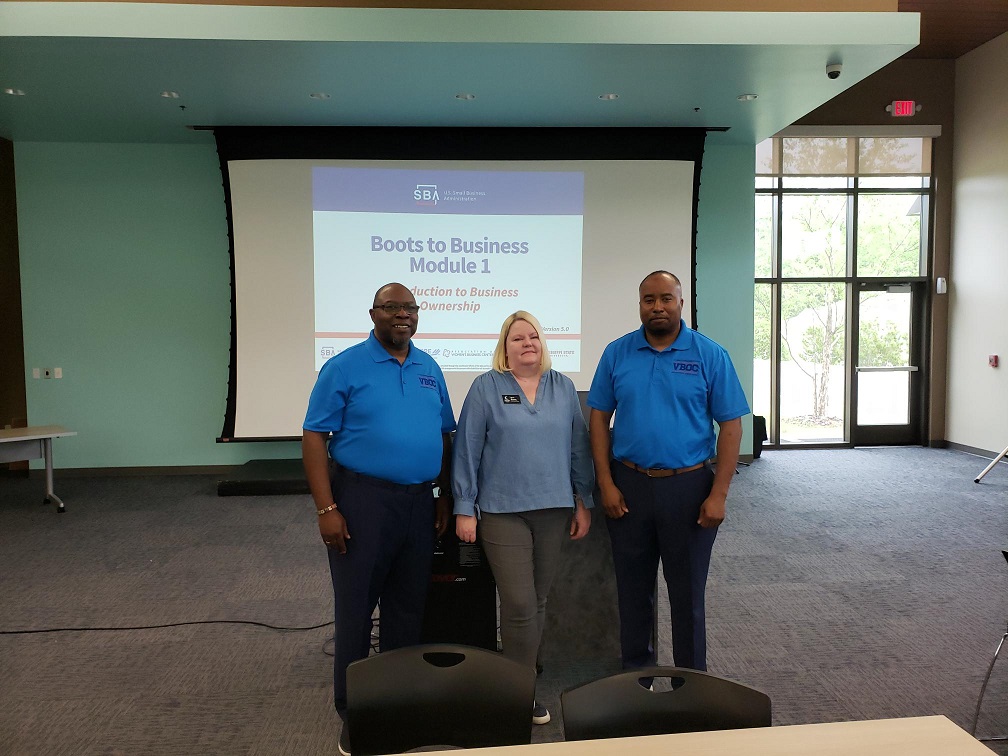
The U.S. Small Business Administration’s (SBA) Boots to Business program is aiming to make a path for those looking to explore business in the military community, aiding service members, their families and Veterans towards their goals of entrepreneurship.
The program, is typically coordinated with local business agencies and military bases. They are administered through what is known as Veteran Business Outreach Centers (VBOC), of which there are 28 in the United States. The VBOC in North Carolina is located at Fayetteville State University.
“Boots to Business is a two day event that is kind of entrepreneurship by fire hose, if you will,” said Ashley Lambeth Christian, the outreach and marketing specialist at the North Carolina office. She has worked on the curriculum for the program. “There are eight modules that go into it and those cover your introductory vetting of a business idea, the different types of legal entities that your business can take on, marketing, the economics of a small business, financing, legal and then resources available to small businesses.”
These programs are folded into what is known at several military bases in America as the Transition Assistance Program (TAPS).
Another option for a more condensed course similar to Boots to Business is the SBA’s Reboot program.
“It covers the same material, but within one day,” Lambeth Christian said. “Those can be held on base, but they're usually held off base for retired service members or military connected family members.”
Lambeth Christian shared that the range of businesses she has seen come through the program is wide.
“Everything that you can think of, from renting out recreational vehicle (RV) trailers, to heating, ventilation, and air conditioning (HVAC) systems, to construction companies… even going back home and just working for a family business,” Lambeth Christian said. “The point is wanting to feel confident in their business skills.”
Aregnaz Mooradian, the SBA’s deputy district director in North Carolina, said that 40 percent of Veteran-owned businesses in the country are in construction, retail and professional, scientific and technical services.
“Those are the major industries that almost half of Veteran-owned businesses participate in,” Mooradian noted.
Boots to Business is meant to help lay the foundations for a solid business idea.
“Realistically, you can't learn everything you absolutely need to know about starting a business in two days,” Mooradian said. “The program can essentially give people a starting point of things to consider, resources to follow-up with, so that they can take this information and apply it to the next follow-up courses. All of these are no-cost programs as well.”
During the course, attendees can workshop their business ideas, as well as think of different scenarios that may arise as their enterprise lifts off the ground.
“Each business is going to be a little bit different,” Lambeth Christian said. “It helps them to kind of individualize a little bit of their business planning. They can talk through that with their peers, as well as their instructors.”
Those business ideas tend to proliferate in the country’s business landscape. For instance, about 6 percent of all small businesses in the U.S. are Veteran-owned, Lambeth Christian said.
She noted that military members and Veterans are starting their entrepreneurial journey from an advantageous position.
“In the military they're learning leadership skills,” Lambeth Christian said. “They’re learning how to deal with very ambiguous situations that are constantly changing, and how to remain level-headed in those. They’re learning how to build relationships, how to make do with what they have.”
Because the program is available to a wide range of former and active military personnel, Boots to Business’ curriculum is flexible to accommodate the different experiences and backgrounds service members and Veterans bring to the table.
“They’re coming in at different levels of knowledge of business and leadership and all of that too,” Lambeth Christian said. “We try to find a way to meet them where they are, essentially, during that course and help them with guiding their business idea."
Lambeth Christian said that the program also serves as a networking opportunity.
“What the instructors will focus on is networking within their classes,” she added. “People taking the class are encouraged to interact with one another. For instance, some prospective entrepreneurs will connect based on potential collaborations.”
“I’ve seen some classes where someone’s business idea could help supply another business and aid with their services,” she noted.
Boots to business courses are available to military members both online and in person throughout the year.
-------------------------
o online to www.sba.my.site.com/s/ to see the most up to date course schedule and for more information on how to register.

Kristen Botts co-founded the program with her husband, Nathan Botts, who is a Veteran himself. Photos provided by Kristen Botts.An organization helping Veterans live a full life after their service in the U.S. Military wants to connect Veterans and d

Patrick NoblesHuntington Bancshares Incorporated announced on Feb. 2 that it has closed its merger with Cadence Bank, a regional bank headquartered in Houston, Texas and Tupelo, Miss. This strategic partnership accelerates Huntington’s growth in

There is extensive dialogue surrounding Fayetteville as a travel destination or city aimed at recruiting new businesses and new residents. As someone who moved here from out of state, I thought it could be fun to share my personal experience as